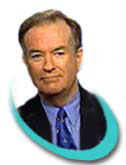Bill O'Reilly: unlikely neurotheology advocate
 Bill O’Reilly (picture; website) is the talking head on Fox News that everyone loves to hate. Now—unlikely as it may seem—he turns out to be the latest advocate for neurotheology! On his Wednesday show, he took up the controversy about the Dalai Lama’s planned speech on the neuroscience of meditation at the meeting of the Society for Neuroscience next month in Washington. 544 researchers have signed a petition against his appearance (NYT ), which seems odd, because he’s appearing not as a scientist, of course, but as part of a new “Dialogues between Neuroscience and Society” track “featuring leaders from fields outside of neuroscience whose work relates to subjects of interest to neuroscientists”.
Bill O’Reilly (picture; website) is the talking head on Fox News that everyone loves to hate. Now—unlikely as it may seem—he turns out to be the latest advocate for neurotheology! On his Wednesday show, he took up the controversy about the Dalai Lama’s planned speech on the neuroscience of meditation at the meeting of the Society for Neuroscience next month in Washington. 544 researchers have signed a petition against his appearance (NYT ), which seems odd, because he’s appearing not as a scientist, of course, but as part of a new “Dialogues between Neuroscience and Society” track “featuring leaders from fields outside of neuroscience whose work relates to subjects of interest to neuroscientists”.
Bill’s guest was Dr. Stuart Dryer, a neuroscientist from the University of Houston who studies such things as embyronic neuronal development in vertebrates, and is opposed to the Dalai Lama’s speech. Bill took him to task in typical O’Reilly-esque fashion, accusing him as coming off as “anti-spiritual”, adding, “The Dalai Lama’s a good guy.”
Somebody should have warned Dryer what he was getting into going onto O’Reilly’s show. I like Bill, but he’s a bully (and pervert) who doesn’t invite guests to hear their opinions, but to lecture them:
The Dalai Lama is being asked to talk about meditation. He claims that you can train the brain to be more compassionate and more positive. That seems to be pretty fascinating and something you might want to hear about.
Bill opined that next year they might want to invite someone to talk about the neurophysiology of prayer as well, since he hears that makes people more loving too.
I’m a little bit conflicted about Bill giving neurotheology such high visibility in the popular culture, especially in his largely right-wing demographic. Before you know it Bush will be pushing more faith-based initiatives claiming that they are good for the brain, or something like that. At the same time, exposure to the basic concept of neurotheology—which, after all, states that physical processes in the brain are a key element in religious experience—could only be helpful. On the other hand, we should not lose sight of one of the scientists’ points: that the research on meditation and the brain is still in its infancy.
In any case, I do think Carol Barnes, who is president of the neuroscience society and responsible for the invitation, had it right:
The practice of meditation is a human behavior, and the Dalai Lama is extraordinarily skilled at it and at promoting qualities of peace and compassion that I thought could bring us together. That’s not the way it’s gone so far.

December 22nd, 2005 at 09:02
Actually, the Dialog Between Science and Society track was used as a way to justify the Dalai Llama’s talk after he was invited. I still think this is a slippery slope (for this particular forum, the Society for Neuroscience Annual Meeting). Again I ask, who next at this meeting, the Pope? Jerry Falwell? The Reverend Moon? Or maybe we should invite the (former) Dover Pennsylvania school board. I am obviously not opposed to these kinds of conversatins in general, but this was not the time or place for it.
As for meditation affecting the brain, I am quite sure it does. Indeed, I would go so far as to say that if I spent hours a day for a decade or two contemplating, say, Bill O’Reilly and a falafel, I am quite certain that people might be able to identify changes in brain function as a result, at least compared to people who led more normal lives. It is fairly fundamental to our understanding of neuronal plasticity that something would change.
Finally, I was prepared, I think, for O’Reilly. I was not prepared for the surreal experience of trying to argue with someone who is only a disembodied voice emerging through a little plug in my ear while looking into a camera with someone giving me hand signals everytime my eyes wanted to move.
Best wishes, and Happy Holidays.
December 4th, 2009 at 05:44
[…] Thought-provoking comments included those on the article Science and Buddhism on craving and suffering and The End of Faith. On my post on Bill O’Reilly: unlikely neurotheology advocate […]